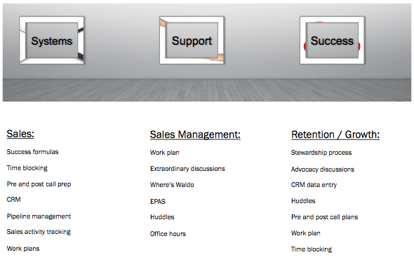Several years ago, as part of our sales team evaluation, the skills, tendencies and effectiveness of the sales leadership team was also assessed. The findings indicated that of the 224 leaders, 23% had at least 60% of the skills required to be an effective performance manger. Of the 5 sales management skill sets required - coaching, motivating, recruiting, mentoring and performance management – this last one, performance management, is where the team “scored” the best. The skills/tendencies within the skill set are as follows:
- Doesn’t accept mediocrity
- Has no need for approval from sales people
- Takes responsibility
- Manages behavior
- Asks Questions
- Manages pipeline
- Has beliefs that support accountability
Before digging into this topic further, just take a minute to examine these results:
- 224 sales leaders
- 23% (51) with the minimum % of skills needed to be successful in their role
- 67% (172) sales leaders below the minimum standards of effectiveness
- Only 1 out of 4 managers, hired to do the job of managing performance and holding sales people accountable, had the skills to do so.
Assume for a minute that this might be your sales organization. Now, you might be thinking, “I don’t have that many sales managers and so my numbers won’t look like this.” You are right; they won’t look like this, but consider the possibility that maybe you didn’t get the 1 out of four! How would you know?
- Do your salespeople meet and exceed goals?
- Do your salespeople consistently have the right volume of pipeline?
- Do your salespeople have a tendency to have up and down weeks, months, quarters or years?
- Do your salespeople blame the economy, the competition, the pricing, the lack of marketing, lack of support, too much paperwork for failure to prospect?
- Have you spent a small fortune for CRM and yet still struggle with trusting the reliability of the pipeline report that you get?
- Are people late to meetings or fail to show up at all, or leave early?
- Does your sales manager take bullets for the failure of the sales team?
Performance Management – Definition (As defined by the University of California Berkley)
- Performance management is an ongoing process of communication between a supervisor and an employee that occurs throughout the year, in support of accomplishing the strategic objectives of the organization. The communication process includes clarifying expectations, setting objectives, identifying goals, providing feedback and reviewing results.
Hogwash! This is part of the definition and this might suit the academics, but in the real world of business, there is something missing! “What’s missing?” you ask.
- Identifying and implementing Rewards for success
- Identifying and implementing Consequences for failure
- Implementing disciplined approaches (structured activities) to correct failure to perform effort or execution.

The Berkley definition is kind of like the LifeLock commercial you see on TV commercials. The bank is being robbed and customers ask the security guard if he is going to do something about the robbery. His response is that he is not a security guard but rather a security monitor. If all a manager does is communicates expectations, sets objectives, identifies goals, reviews results (“you are not hitting your goals”) and provides feedback (“You have to work harder”), then performance really isn’t managed; it’s just monitored.
As long had you have a sales team consisting of self-starters, self-managed, high figure-it-out people, then you are okay. BUT, and this is a BIG BUT(T), you probably don’t have an entire team of people like this. Short of having a team that just needs to be pointed in the right direction, an organization needs someone to manage performance and hold people accountable to individual commitments.
The organization needs someone that can reward people for success through compensation and recognition. As important, if not more important, your performance management manager MUST be able to recognize early when people are off-track. This person must have implemented the right systems and process for early detection. And the person must be strong enough to have fierce conversations with people when they are failing to perform.
Finally, there must be a process of disciplined and structured correction procedures so that those failing to execute have a chance to succeed. PIPs are not the answer. PIPs are to late to have a significant impact. By the time you attempt to put someone on a PIP that horse has left the barn.
Additional Resources:
- Sales Management Certification – Call me at 513.226.3913 or text SMECert and provide me a name and number to call
- For our SME Certification Slidedoc – Email Jeni@anthonycoletraining.com
- Evaluate your sales team – Email Jack@anthonycoletraining.com


